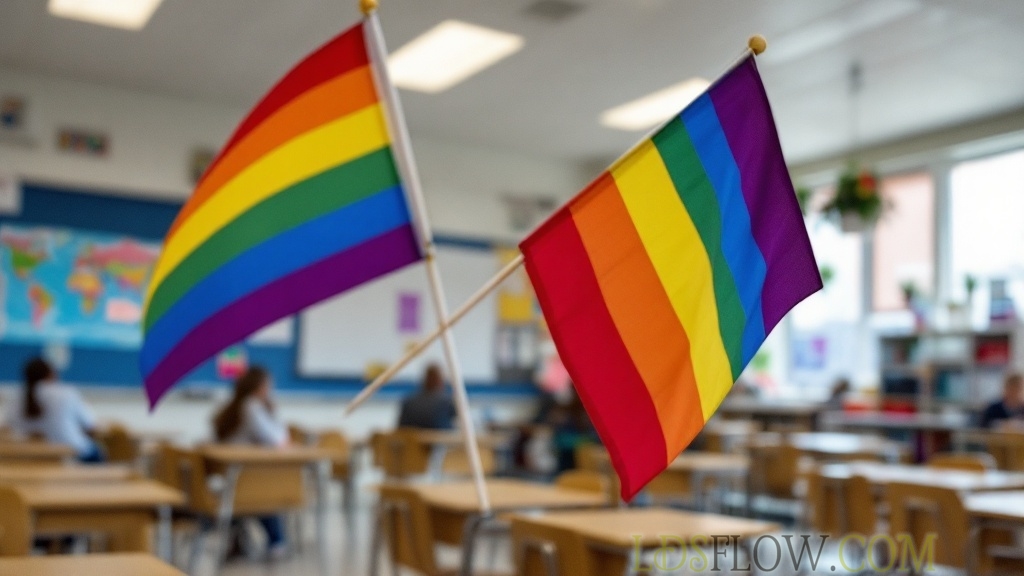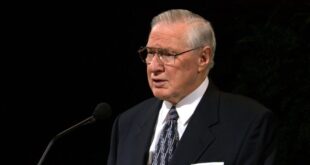Every summer, as Pride Month arrives and rainbow flags appear across communities and timelines, many Latter-day Saints find themselves in a deep tension. Can you be true to the restored gospel and still support your LGBTQ friends and family? Is there room for compromise, or is support for Pride a step too far—apostasy disguised as compassion? These aren’t just academic questions. They reach into our homes, our congregations, our schools, and our personal testimonies. They demand honesty, courage, and clarity in a world that’s changing fast.
The Unchanging Value of Each Soul
The Church of Jesus Christ of Latter-day Saints affirms that every person is a beloved child of Heavenly Parents, created in Their image with infinite worth and potential. That fundamental truth does not shift based on one’s sexual orientation, gender identity, or life experiences. President M. Russell Ballard explained: “The experience of same-sex attraction is a complex reality for many people. The attraction itself is not a sin, but acting on it is.”
This distinction is at the heart of the Church’s position: being gay, lesbian, bisexual, or experiencing gender dysphoria is not, in itself, sinful. The Church’s concern arises with sexual behavior outside of marriage between a man and a woman. For those who choose to live by the law of chastity, full participation in Church life remains available. That means receiving a temple recommend, serving in callings, and holding the priesthood is fully open to LGBTQ members who honor Church standards.
President M. Russell Ballard put it simply:
“The experience of same-sex attraction is a complex reality for many people. The attraction itself is not a sin, but acting on it is.”
The unique challenges faced by LGBTQ members are real. Their efforts to live the commandments, often in the face of misunderstanding or loneliness, are recognized by both the Church and the Lord. The Church is clear: God’s love is unconditional. There is a place for all His children in His Church.
The Reality in Today’s Schools and Homes
If you are a parent today, you know the social landscape has shifted dramatically. Years ago, the school cafeteria was filled with “jocks,” “nerds,” and a handful of other classic groups. Today, LGBTQ+ groups are visible, conversations about gender and sexuality are open, and rainbow flags hang in classrooms—even at the elementary level. School libraries are stocked with books on every possible identity, and some educators see themselves as advocates for inclusivity and acceptance.
For some, this visibility means progress—a world less hostile and more supportive for those who once suffered in silence. But for many Latter-day Saint parents, it raises new questions. Are our children being influenced to experiment with new identities not because of innate orientation, but because of a powerful drive to belong? Are some adults in authority crossing a line from acceptance into outright advocacy and encouragement?
This is not a simple black-and-white issue. There are children who genuinely experience same-sex attraction or gender identity questions from a young age. These children deserve love, respect, and support. However, it is also true that, in some school and social environments, “trying on” LGBTQ+ labels can become a way for children and teens to seek inclusion or attention. That does not invalidate real experiences, but it does highlight the complex social forces at play.
Parental and Church Stewardship
As covenant-keeping parents and Church members, our responsibility is twofold. First, we are called to show Christlike love to everyone. Second, we are responsible for teaching the eternal truths of the gospel, including the divine nature of gender and the law of chastity. “The Family: A Proclamation to the World” is clear: Gender is eternal and central to our identity and purpose. These doctrines don’t change, even when society’s norms do.
This commitment does not mean shutting down difficult conversations. If your child approaches you with confusion or questions about their identity, the most Christlike response is patience, love, and clarity—not anger or judgment. Listen carefully, and then teach gently. The Church encourages open, honest, and loving discussion. The home should be a safe place, where children can talk about anything without fear.
Teaching gospel principles in the home is more critical than ever. Share scriptures that emphasize the worth of every soul, kindness to all, and the divine nature of gender and family. Make sure your children know they are loved no matter what, and that they can ask questions and be heard.
At the same time, do not shy away from the “why” behind Church teachings. The aim isn’t blind obedience, but a deep understanding rooted in faith, agency, and an understanding of each person’s divine identity.
The Church’s Current Stance
The Church’s position on LGBTQ issues is clear yet nuanced. Identifying as LGBTQ is not a sin. Same-sex sexual activity is not permitted by Church doctrine, and same-sex marriage is neither recognized nor performed. However, LGBTQ members who keep the commandments and the law of chastity can serve fully in the Church and are encouraged to seek personal revelation and cultivate a personal relationship with God.
The Church continues to make efforts to be a more welcoming place. Resources are available, and local leaders are encouraged to offer support. The importance of professional counseling—in harmony with gospel principles—is recognized as well. If you need help, reach out to your local leaders. Prepare for those conversations with prayer and openness. The Church is here to help, not to condemn.
Where Does That Leave “Pride” and Its Supporters?
This brings us back to the original question: Can you support Pride and remain a faithful Latter-day Saint? The answer depends entirely on what “support” means. If supporting Pride is about affirming the dignity and worth of LGBTQ individuals, the gospel requires nothing less. If it becomes advocating for doctrinal change, public opposition to Church teachings, or supporting behaviors the Church defines as sinful, that crosses a line—at least according to current Church leadership and policy.
Many members try to walk a careful line—publicly rejecting bullying and mistreatment, supporting friends and family, but stopping short of endorsing all aspects of the LGBTQ movement. Others feel compelled to advocate for more radical acceptance, believing that Christ’s love demands it. There is tension here, and no simple way to resolve it. The Church cautions against open dissent and advocacy for doctrinal change, but also teaches that kindness and compassion are always required.
The Role of Agency, Faith, and Humility
These are issues that demand personal revelation. Each member must wrestle, pray, and seek answers. It takes humility to love those who are different while standing firm in faith. It takes courage and faith to trust that God sees and loves all His children, even as we struggle to get things right. As President Russell M. Nelson taught, “As the world continues to ripple with seismic shifts and storms, the Lord expects us to continue to move forward and to use our best efforts to sustain and defend the kingdom of God.” That means teaching our families, living the gospel, and reaching out with Christlike love—even when the world disagrees.
Finding Peace in Complexity
There is no simple, one-size-fits-all answer to these questions. The path of discipleship in today’s world is filled with complexity and paradox. Yet, the foundational truths remain unshaken:
Every person has infinite worth in God’s eyes.
Christlike love is not optional.
Church doctrine on chastity and marriage remains unchanged.
The home is the most important place to teach and reinforce gospel principles.
Open, loving, and honest conversations are vital.
Both personal revelation and professional help have a role.
As Latter-day Saints, our calling is to love, teach, protect, and guide the next generation with both conviction and compassion. There is room for honest struggle, for differing opinions, and for heartfelt questions. The only true apostasy is to abandon love for God or for your neighbor. Everything else is part of our journey of faith, and we are all learning together.
If you need help, reach out. If you are unsure, keep praying and seeking. If you are hurting, know you are not alone. The Lord stands ready to guide you, and so does His Church.
Practical Tips for Parents, Leaders, and Members
For Parents:
Listen deeply. When your child brings up questions or confusion, pause your reaction and really listen.
Keep the conversation open. Let your child know that nothing is “off limits” for discussion.
Teach the doctrine with love. Explain the Church’s teachings on chastity and marriage, but also God’s unconditional love for all.
Share your own journey. Admit you don’t have all the answers, but you’ll seek them together.
Stay engaged. Keep your child close with family activities, Church involvement, and healthy friendships.
Encourage professional help. If your child is struggling, seek counseling from trusted, gospel-aligned professionals (like LDS Family Services).
For Church Leaders:
Prepare spiritually before interviews. Pray for compassion and understanding before meeting with LGBTQ members.
Assure confidentiality and support. Tell members you’re there to help, not judge.
Point to resources. Share available Church materials, websites, and professional counseling options.
Follow up. Don’t let it be a one-time conversation. Check in regularly.
For All Members:
Reject bullying and exclusion. Stand up against unkindness in any form, inside or outside the Church.
Be a safe person. Make it clear through your actions and words that everyone is welcome to sit with you, worship with you, and be your friend.
Model respect for others’ beliefs and choices. As President Oaks said, “We must live peacefully with those who do not share our values.”
Pray for personal revelation. The Spirit will help you navigate individual relationships with wisdom and love.









No
But you can be LDS and support racism, slavery, child prostitution, and other atrocities. 🙄
Tyson Kidder the church received a lot of prosecutions for being anti slavery.
Also the church has spent millions to help end child prostitution
Brian Walker If you believe this without nuance then you are incredibly ignorant of a. Church history, b. Church current events and c. Chuck scriptures.
Tyson Kidder ignorant? My brother has a masters in history and my uncle who has published for the church was a byu professor of church history
Brian Walker I know you’re ignorant based on your claims made above. I don’t know why your family relations have anything to do with your knowledge.
Tyson Kidder Because not only do I know church history, I know the unfiltered church history.
Brian Walker If you know the unfiltered church history than you know about the racism, the slavery, child prostitution, the abuse, and other atrocities.
Tyson Kidder All of those things are lies.
Brian Walker Just a sampling: Brigham Young was pro-slavery and tried to make Utah a slave territory. (Joseph Smith would flip-flop on the issue depending on who he was interacting with.) Many church presidents and leaders married girls and even had children with some. Abuse is rampant among church members and instead of putting the victim first, the church instructs leaders to protect the abuser. Look at the Adams’ case which is indicative of such instances. Sam Young tried to shed light on these issues and was excommunicated (for trying to protect children). Just look at the work of the Floodlit project. The list goes on and on but tell me how it’s a lie so you can comfortably live in your ignorant bubble.
Tyson Kidder I’ve read about such. Many of those stories are from sources that are not trustworthy. For example it was recorded by someone going off memory of what he heard others said many years after the so called fact. Also some of these sources the author had an axe to grind against the church. Likely these stories are revenge in nature or exaggerations. Sam Clements for example lived in neighboring Nevada during this time. (in fact he met Brigham Young once.) Anyway he got his career started for publishing tall tales as news. People didn’t care. They just needed content for the paper to function. In addition, I have a hard time believing that Brigham Young had the time or interest in hunting down someone on a Sunday only to beat them for not going to church. Don’t you think governing 120 thousand people might make a person too busy to hunt down an individual for the high crime of not going to church? Seems kind of ridiculous to me, plus the report comes unreliable sources.
Brian Walker You do realize this argument is why you cannot accept/trust many LDS claims as well? Most faith affirming events were recorded years after the fact and when further research is done we learn these miracles that are used as evidence weren’t really miraculous or didn’t even happen. The miracle of the seagulls and the crickets. Brigham Young’s face changing to Joseph Smith. The boys, the river, and the handcarts. Joseph Smith’s claims surrounding the plates. Etc. BY was pro-slavery and we know he wa because he spoke in front of the Utah Territorial Legislature on behalf of thrr church and it was recorded. The church itself has so much recorded history that we don’t need to go to outside sources to find questionable or dubious tales or events.
Tyson Kidder you keep posting the same bogus claims. That doesn’t make them so.
Tyson Kidder I don’t support racism.. or slavery or any of it. I’m LDS. And even adultery I don’t support. If anyone goes against Gods word first thing is I warn them second time I’m not.. I’m not trying to dick around on the people that actually need saving
Tyson Kidder rubbish, I’m LDS and all of that is abhorrent to me. What are you talking about??
No
Michael Thomas How do you define support?
This post seems to be trying to stir up controversy.
Michael McVey I agree. X
Michael McVey I thought I was VERY KIND when writing this, PLEASE point to what is problematic and perhaps I can change it.
Hate the Sin……..period
You can’t
No
God said no
Not us God did he speaks for all of us
Making kids gay I won’t except bring back the wooden parks and stop adding all these rainbows kids are gonna think it’s okay to be gay because of this new generation
You can’t be a Christian and support that come on people
No
No
no never
Nope how can you support something that is not taught? The Lord has described His ways and this wasn’t one of them!